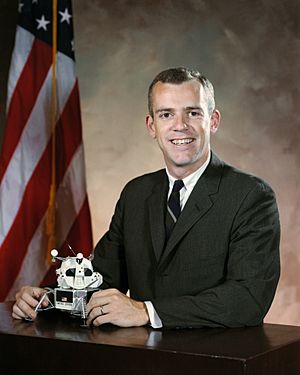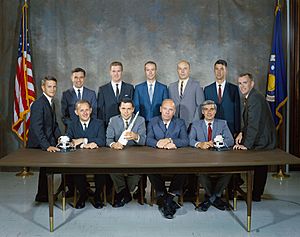Brian O'Leary facts for kids
Quick facts for kids
Brian T. O'Leary
|
|
|---|---|
 |
|
| Born | January 27, 1940 Boston, Massachusetts, U.S.
|
| Died | July 28, 2011 (aged 71) |
| Nationality | American |
| Other names | Brian Todd O'Leary |
| Alma mater | Williams College, B.A. 1961 Georgetown University, M.A. 1964 UC Berkeley, Ph.D. 1967 |
| Occupation | Scientist |
| Space career | |
| NASA Astronaut | |
| Selection | NASA Astronaut Group 6 1967 |
| Missions | None, resigned before completing initial training |
| Retirement | April 23, 1968 |
| Scientific career | |
| Fields | Astronomy |
| Thesis | Mars: visible and near infrared studies and the composition of the surface. (1967) |
Brian Todd O'Leary (January 27, 1940 – July 28, 2011) was an American scientist, author, and NASA astronaut. He was chosen as part of NASA Astronaut Group 6. This group of scientist-astronauts was meant to train for the Apollo Applications Program.
Contents
Who Was Brian O'Leary?
Brian O'Leary was born in Boston, Massachusetts, on January 27, 1940. As a teenager, he visited Washington, D.C.. This trip inspired him to become an astronaut. He married Delores Marie Lefkowitz, also known as Dee Davenport, in 1983.
Brian O'Leary's Education
O'Leary finished Belmont High School in 1957. He earned a Bachelor of Arts (B.A.) degree in physics from Williams College in 1961. He then received a Master of Arts (M.A.) degree in astronomy from Georgetown University in 1964. In 1967, he earned his Ph.D. in astronomy from the University of California, Berkeley.
What Organizations Did He Join?
In 1975, O'Leary became a Fellow of the American Association for the Advancement of Science. From 1970 to 1976, he was the secretary of the American Geophysical Union's Planetology Section. In 1977, he led a team for NASA's study on space settlements. This team focused on using resources from asteroids.
His Time as a NASA Astronaut
While studying at the University of California, Berkeley, O'Leary wrote papers about the atmosphere of Mars. His Ph.D. work in 1967 was about the Martian surface. Because of his knowledge and age, NASA chose him as an astronaut. At that time, NASA was thinking about a human mission to Mars in the 1980s.
O'Leary was the only planetary scientist in the NASA Astronaut Corps during the Apollo program. He left the Astronaut Corps in April 1968. This was before he finished his training program.
Brian O'Leary's Teaching Career
After leaving NASA, Carl Sagan invited O'Leary to teach at Cornell University in 1968. He stayed there until 1971, first as a researcher and then as an assistant professor of astronomy. At Cornell, he studied lunar mascons, which are areas of higher gravity on the Moon.
From 1970 to 1971, O'Leary was a visiting researcher at the California Institute of Technology. He was also deputy team leader for the Mariner 10 TV Science Team. This team studied Venus and Mercury. The team received an award from NASA for their work.
O'Leary also taught at other universities. These included San Francisco State University, UC Berkeley School of Law, Hampshire College, Princeton University, and California State University, Long Beach. At Princeton, he worked with Gerard K. O'Neill on plans for orbiting space cities. He thought that asteroids and the moons of Mars would be good sources of materials for these space colonies. O'Leary also wrote and edited books about astronomy and space travel.
His Political Involvement
O'Leary became involved in politics early in his career. In 1970, he took part in a protest in Washington, D.C.. This protest was against the Cambodian Campaign. Officials from the government invited O'Leary and other professors to share their ideas.
In 1975 and 1976, he advised Morris Udall during his presidential campaign. He also worked as a special consultant on energy for a U.S. House committee. O'Leary also worked for other U.S. presidential candidates, including Jesse Jackson, Dennis Kucinich, George McGovern, and Walter Mondale.
During these years, he wrote about the Space Shuttle, NASA's Moon landings, and the idea of using space for weapons. In the late 1980s, O'Leary traveled to the Soviet Union twice. His goal was to promote peaceful space exploration. This included a peace trip along the Dnieper River.
Later Life and Interests
After his time at Princeton, O'Leary worked at Science Applications International Corporation. He chose not to work on military space projects. Because of this, he left his job there in 1987. After 1987, O'Leary explored new ideas about science and consciousness. He became known for his writings on "the frontiers of science, space, energy and culture."
He gave lectures at places like the Findhorn Foundation and Esalen Institute. In 2008, O'Leary and his wife, artist Meredith Miller, started the Montesueños Eco-Retreat. This retreat in Vilcabamba, Ecuador focuses on peace, sustainability, the arts, and new science.
Death
Brian O'Leary passed away on July 28, 2011. He died from intestinal cancer at his home in Vilcabamba, Ecuador.
 | Audre Lorde |
 | John Berry Meachum |
 | Ferdinand Lee Barnett |


